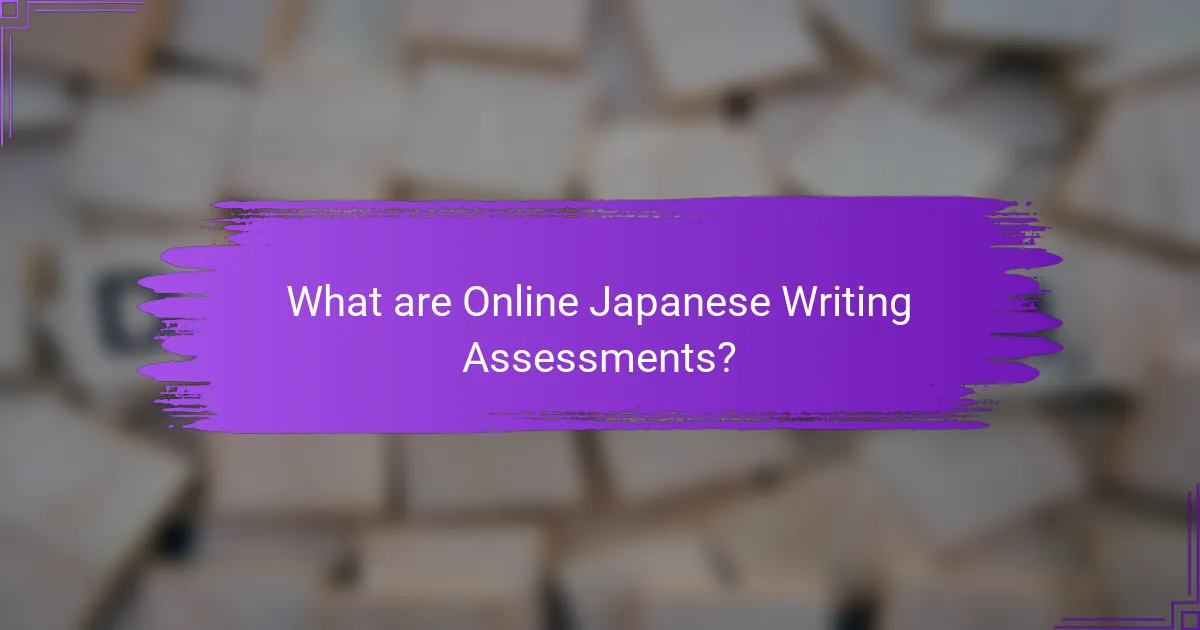
What are Online Japanese Writing Assessments?
Online Japanese Writing Assessments are evaluations conducted via digital platforms to gauge a learner’s proficiency in Japanese writing. These assessments typically include tasks such as essays, short answers, or creative writing prompts. They are designed to measure various aspects of writing, including grammar, vocabulary, and coherence. Scoring often uses specific rubrics that outline criteria for evaluation. Many assessments provide immediate feedback to learners, enhancing the learning experience. Research indicates that online assessments can improve writing skills through targeted practice. They also allow for flexibility in scheduling and accessibility for learners worldwide.
How are Online Japanese Writing Assessments conducted?
Online Japanese Writing Assessments are conducted through structured digital platforms. These platforms provide prompts or topics for participants to write about. Participants typically complete their writing within a specified time frame. Submissions are then evaluated based on predetermined rubrics. Rubrics assess various criteria, including grammar, vocabulary, coherence, and overall writing quality. Feedback is often provided to help learners improve their skills. Many assessments utilize automated tools for initial grading, followed by human evaluators for final assessments. This combination ensures a comprehensive evaluation of writing capabilities.
What technologies are used in Online Japanese Writing Assessments?
Online Japanese writing assessments utilize various technologies to enhance evaluation. These include automated essay scoring systems that use natural language processing to analyze written content. Additionally, online platforms provide tools for real-time feedback and assessment. Video conferencing software facilitates oral assessments alongside written tasks. Learning management systems manage submissions and track student progress effectively. Cloud-based storage ensures secure access to assessment materials. These technologies collectively improve the accuracy and efficiency of evaluating Japanese writing skills.
What platforms offer Online Japanese Writing Assessments?
Platforms that offer Online Japanese Writing Assessments include WaniKani, Lang-8, and Italki. WaniKani provides a structured approach to learning kanji and vocabulary. Lang-8 allows users to write in Japanese and receive corrections from native speakers. Italki connects learners with professional teachers for personalized writing feedback. Each platform focuses on enhancing writing skills through interactive assessments. These platforms are widely recognized for their effectiveness in language learning.
Why are Online Japanese Writing Assessments important?
Online Japanese writing assessments are important because they evaluate language proficiency effectively. They provide immediate feedback to learners, enhancing their writing skills. These assessments can be tailored to various proficiency levels, ensuring relevance. They also facilitate standardized evaluation across different learning contexts. Research shows that timely feedback significantly improves learning outcomes. Additionally, online assessments can be accessed anytime, promoting flexibility in learning. This accessibility encourages more consistent practice among students. Overall, these assessments play a crucial role in language acquisition and skill development.
How do Online Japanese Writing Assessments benefit learners?
Online Japanese writing assessments benefit learners by providing immediate feedback on their writing skills. This instant feedback helps learners identify areas for improvement. Additionally, these assessments often use standardized rubrics. Standardized rubrics ensure consistency in evaluation and help learners understand expectations.
Moreover, online assessments can be accessed anytime and anywhere. This flexibility allows learners to practice at their own pace. Many platforms also offer personalized learning pathways. Personalized pathways cater to individual learning needs and styles.
Research shows that learners who engage in regular writing assessments improve their language proficiency faster. A study by the Journal of Language Learning found that consistent writing practice leads to better retention of vocabulary and grammar structures. Thus, online Japanese writing assessments effectively enhance learners’ writing abilities.
What role do Online Japanese Writing Assessments play in language acquisition?
Online Japanese Writing Assessments play a crucial role in language acquisition by providing structured feedback and evaluation. They help learners identify their strengths and weaknesses in writing skills. These assessments often utilize rubrics that outline specific criteria for evaluating writing. This clarity allows students to understand what is expected in their written work. Additionally, online platforms can offer instant feedback, facilitating immediate learning opportunities. Research indicates that timely feedback significantly enhances language learning outcomes. Studies show that consistent writing practice and assessment contribute to improved proficiency. Therefore, Online Japanese Writing Assessments are integral to developing writing skills in language acquisition.

What formats are available for Online Japanese Writing Assessments?
Online Japanese Writing Assessments are available in several formats. These include multiple-choice questions, short answer responses, and essay writing tasks. Each format evaluates different writing skills and proficiency levels. Multiple-choice questions assess grammar and vocabulary. Short answer responses require concise expression of ideas. Essay writing tasks evaluate coherence, structure, and argumentation. These formats provide a comprehensive approach to assessing writing abilities in Japanese.
What types of writing formats are used in assessments?
Assessments utilize various writing formats. Common formats include essays, reports, and short answer questions. Essays allow for in-depth exploration of topics. Reports typically present information in a structured manner. Short answer questions require concise responses. Each format assesses different skills and knowledge levels. For instance, essays evaluate critical thinking and argumentation. Reports assess research and organization skills. Short answer questions test recall and comprehension. These formats are widely recognized in educational settings.
How do different writing formats impact assessment outcomes?
Different writing formats significantly impact assessment outcomes by influencing clarity, organization, and engagement. For instance, structured formats like essays promote logical flow and coherence. This organization aids evaluators in assessing critical thinking skills effectively. Conversely, free-form formats may allow for creativity but can lead to ambiguous interpretations. Research indicates that clear formatting improves readability and comprehension, resulting in better assessment scores. A study by Graham and Perin (2007) found that students using structured formats performed better in writing assessments. Thus, the choice of writing format directly affects the quality of assessment outcomes.
What are the advantages of each writing format?
The advantages of each writing format vary based on purpose and audience. Narrative writing engages readers through storytelling and emotional connection. Expository writing provides clear and concise information, making complex topics understandable. Descriptive writing enhances imagery, allowing readers to visualize concepts vividly. Persuasive writing aims to influence opinions, using arguments and evidence to convince the audience. Technical writing delivers precise instructions or information, essential for clarity in manuals and guides. Each format serves distinct functions, catering to different communication needs and enhancing overall comprehension.
What assessment criteria are typically included in Online Japanese Writing Assessments?
Assessment criteria in Online Japanese Writing Assessments typically include grammar accuracy, vocabulary usage, coherence, and organization. Grammar accuracy evaluates sentence structure and verb conjugation. Vocabulary usage assesses the appropriateness and variety of words used. Coherence measures the logical flow of ideas. Organization examines the overall structure of the writing, including paragraphing and transitions. Additionally, some assessments may include criteria for cultural appropriateness and style. These criteria ensure a comprehensive evaluation of writing skills in the Japanese language.
How are rubrics developed for assessing writing?
Rubrics for assessing writing are developed through a systematic process. This process typically begins with defining the purpose of the assessment. Educators identify specific writing skills and objectives to be measured. Next, they outline the criteria that reflect these skills. Common criteria include organization, content, grammar, and style.
After establishing criteria, educators create performance levels for each criterion. These levels often range from excellent to poor. Each level includes descriptions that clarify expectations. This helps ensure consistency in grading.
Finally, rubrics are tested and revised based on feedback from actual assessments. This iterative process enhances reliability and validity. Research indicates that well-structured rubrics improve student understanding of expectations and performance outcomes.
What key attributes are evaluated in writing assessments?
Key attributes evaluated in writing assessments include content, organization, language use, and mechanics. Content assesses the relevance and depth of ideas presented. Organization evaluates the structure and flow of the writing. Language use examines vocabulary, sentence variety, and style. Mechanics focuses on grammar, punctuation, and spelling accuracy. Each attribute plays a critical role in determining the overall effectiveness of the writing.

How can learners improve their performance in Online Japanese Writing Assessments?
Learners can improve their performance in Online Japanese Writing Assessments by practicing regularly and utilizing feedback effectively. Consistent writing practice enhances fluency and familiarity with language structures. Engaging with native materials, such as articles and videos, exposes learners to authentic language use. Additionally, using writing prompts can stimulate creativity and application of learned vocabulary.
Seeking feedback from instructors or peers helps identify areas for improvement. This feedback can guide learners in refining their grammar and style. Utilizing online resources, such as language exchange platforms, allows for real-time writing practice with native speakers. Lastly, familiarizing oneself with assessment rubrics ensures learners understand what evaluators prioritize, such as coherence, vocabulary, and grammar accuracy.
What strategies can students use to enhance their writing skills?
Students can enhance their writing skills by practicing regularly. Consistent writing fosters improvement and builds confidence. They should read extensively to expose themselves to different writing styles. Analyzing well-written texts helps students understand effective techniques. Seeking feedback from peers or instructors is crucial for identifying areas of improvement. Utilizing writing prompts can inspire creativity and focus on specific skills. Engaging in writing workshops or online courses provides structured guidance. Setting specific writing goals helps track progress and maintain motivation. These strategies are supported by educational research indicating that practice and feedback significantly enhance writing proficiency.
How does feedback influence improvement in writing?
Feedback significantly influences improvement in writing by providing specific guidance on areas that need enhancement. It helps writers identify strengths and weaknesses in their work. Constructive feedback can clarify misunderstandings in grammar, structure, and style. This targeted advice allows writers to make informed revisions. Research indicates that feedback fosters a growth mindset, encouraging writers to engage more deeply with their craft. A study by Hattie and Timperley (2007) found that effective feedback significantly enhances student learning outcomes. Feedback also promotes self-reflection, enabling writers to evaluate their progress over time. By incorporating feedback, writers can develop their skills and produce higher-quality work.
What resources are available for practicing writing in Japanese?
Resources available for practicing writing in Japanese include online platforms, textbooks, and writing communities. Websites like Lang-8 and HiNative allow users to write in Japanese and receive feedback from native speakers. Textbooks such as “Genki” and “Minna no Nihongo” offer writing exercises and structured practice. Additionally, online communities on platforms like Reddit and Discord provide spaces for writers to share their work and receive critiques. These resources support learners in developing their writing skills through practical application and interaction with others.
What common challenges do learners face in Online Japanese Writing Assessments?
Learners face several common challenges in Online Japanese Writing Assessments. One significant challenge is limited vocabulary. Many learners struggle to express their ideas due to a lack of words. Another challenge is grammar usage. Incorrect grammar can lead to misunderstandings in written communication. Additionally, learners often face issues with kanji recognition. This can hinder their ability to write accurately. Time constraints during assessments can also create pressure, affecting performance. Moreover, the lack of immediate feedback in online formats can impede learning. Lastly, technical issues such as connectivity problems can disrupt the assessment process. These challenges collectively impact the effectiveness of online writing assessments.
How can learners overcome these challenges?
Learners can overcome challenges in online Japanese writing assessments by utilizing effective strategies. They should practice writing regularly to enhance their skills. Engaging with native speakers can provide valuable feedback. Utilizing online resources, such as writing forums and language exchange platforms, can also help. Setting specific goals for each writing task can improve focus and motivation. Reviewing feedback from assessments allows learners to identify areas for improvement. Participating in study groups can foster collaboration and support. Lastly, using rubrics to understand assessment criteria encourages targeted practice.
What are best practices for preparing for writing assessments?
Best practices for preparing for writing assessments include understanding the assessment format and requirements. Familiarize yourself with the rubric and evaluation criteria. Practice writing regularly to enhance fluency and coherence. Review sample responses to identify effective techniques. Seek feedback from peers or instructors to improve writing skills. Develop a structured outline before writing to organize thoughts clearly. Time management is crucial; allocate specific time for planning, writing, and revising. Lastly, read extensively to improve vocabulary and understanding of different writing styles.
What are the latest trends in Online Japanese Writing Assessments?
The latest trends in online Japanese writing assessments include the integration of AI technology for personalized feedback. These assessments utilize machine learning algorithms to evaluate grammar and vocabulary usage. Adaptive learning platforms are becoming popular, tailoring tasks to individual student needs. Real-time collaboration tools are also trending, allowing peer review and interaction. Moreover, gamification elements are being incorporated to enhance student engagement. Analytics are increasingly used to track progress and identify areas for improvement. Research shows that these trends improve overall language proficiency and writing skills among learners.
How is technology shaping the future of writing assessments?
Technology is shaping the future of writing assessments by enabling innovative evaluation methods. Digital platforms allow for real-time feedback and adaptive learning experiences. These platforms utilize artificial intelligence to assess writing quality efficiently. They can analyze grammar, coherence, and style with high accuracy. For example, tools like Grammarly and Turnitin provide instant feedback on written submissions. Such technology enhances the assessment process by offering personalized learning pathways. Additionally, online assessments can include multimedia elements, engaging students in diverse ways. The integration of technology in writing assessments promotes accessibility and flexibility for learners.
What innovations are emerging in assessment formats and rubrics?
Innovations in assessment formats and rubrics include the integration of technology and personalized feedback mechanisms. Digital platforms allow for adaptive assessments that adjust to a learner’s level. Rubrics are evolving to incorporate real-time data analytics for tracking progress. Peer assessment is gaining traction, promoting collaborative learning. Automated feedback tools are enhancing the speed and specificity of responses. Gamification elements are being added to increase engagement and motivation. These innovations are supported by research indicating improved learning outcomes through interactive and personalized assessment methods.
What practical tips can enhance success in Online Japanese Writing Assessments?
To enhance success in Online Japanese Writing Assessments, focus on practicing structured writing. Use outlines to organize thoughts before writing. Familiarize yourself with assessment rubrics to understand grading criteria. Incorporate varied vocabulary and grammar structures to demonstrate language proficiency. Review and edit your work for clarity and coherence. Utilize online resources and writing tools for additional support. Engage in peer review to gain feedback on your writing. Consistent practice and feedback can significantly improve writing skills.
Online Japanese Writing Assessments are digital evaluations designed to measure proficiency in Japanese writing through various tasks such as essays and short answers. These assessments utilize structured rubrics to evaluate key attributes like grammar, vocabulary, and coherence, providing immediate feedback to enhance learning outcomes. The article explores the technologies and platforms used in these assessments, the importance of feedback, and practical strategies for learners to improve their writing skills. Additionally, it highlights common challenges faced by learners and innovative trends shaping the future of writing assessments.